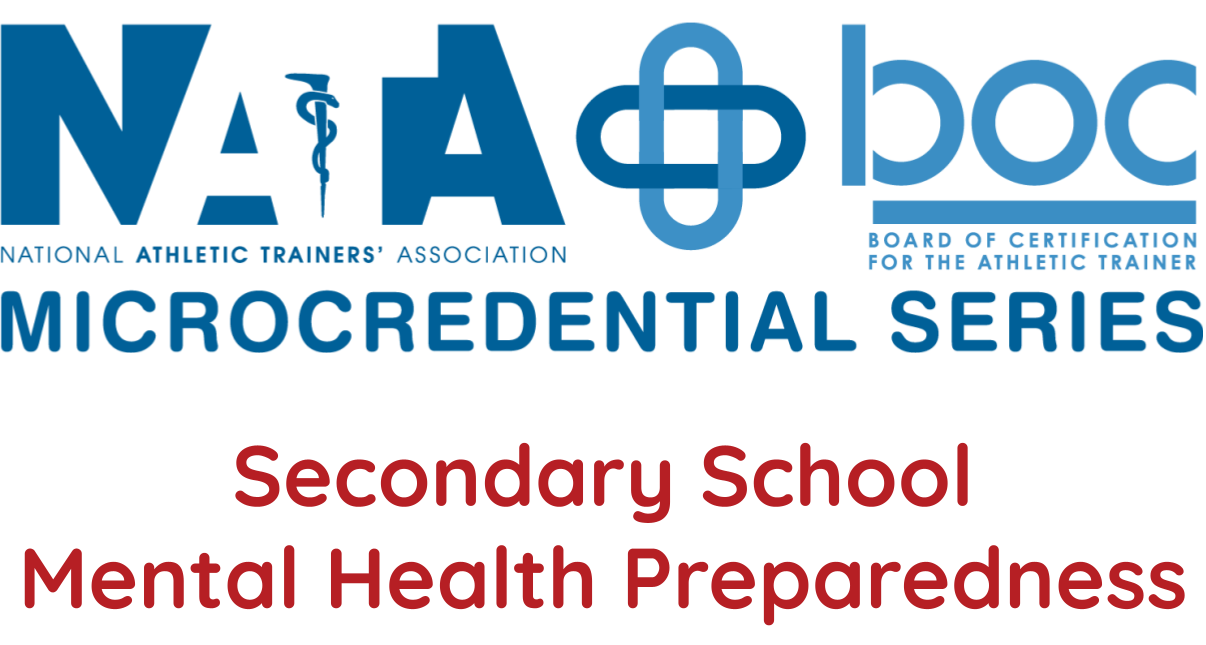
Module 6 - Developing and Implementing Mental Health Emergency Protocols in the Secondary School
| Mental Health Emergency Planning |
Abstract:
There is a valuable opportunity to enhance athletic trainers' (ATs) understanding of mental health emergency planning. Secondary school athletic trainers can benefit from updated knowledge about the latest guidelines and best practices for mental health emergency response, which can lead to more timely and effective interventions. This educational session aims to bridge gaps by empowering secondary school athletic trainers to recognize and respond effectively to mental health emergencies. By enhancing ATs' skills and understanding of emergency procedures, the session provides information to help improve overall emergency preparedness and patient outcomes, ultimately ensuring that ATs are well-equipped to meet the mental health needs of their patients and athletes.
Learning Objectives:
- Identify the need to plan for a mental health emergency in the secondary setting.
- Compare emergency action plans with policy and procedures.
- Organize information to generate policies that can be used in practice.
| Clinical Commentary: Depression and Anxiety in Adolescent and Young Adult Athletes |
Abstract:
Mental health (MH) symptoms and disorders are common in adolescents and young adults, and athletes may be at risk due to sport-specific triggers such as injury or illness as well as stressors related to performance, transition, or retirement from sport. Anxiety and depression are reported frequently in this age group, and early recognition and treatment can improve outcomes. The medical team (eg, athletic trainers or therapists, team physicians) should be familiar with the symptoms of depression and anxiety, recognize “red flags” for these symptoms and disorders, and seek to provide screening assessments and develop MH plans and MH emergency action plans. As a part of their scope of practice, team physicians should have the initial assessment and management of patients with these MH conditions and appreciate the importance of referrals to other MH providers with expertise caring for athletes. Athletic trainers are often the first point of contact for athletes who may be experiencing MH symptoms and therefore play a key role in early recognition and referrals to team physicians for early diagnosis and treatment. Additional resources that provide more in-depth information regarding the treatment and management of anxiety and depression are provided herein.
Learning Objectives:
- Identify the importance of mental health emergency planning in secondary school athletic settings and distinguish between general emergency action plans (EAPs) and mental health-specific policies and procedures.
- Recognize signs and symptoms of mental health crises that require activation of a mental health emergency action plan (MHEAP) and apply best practices for responding to these emergencies in secondary school athletic environments.
- Develop and organize effective mental health emergency policies and procedures for implementation in secondary school athletic settings.
Course Level:
Essential
Course Domain(s):
Domain 2: Assessment Evaluation and Diagnosis
Domain 3: Critical Incident Management
Domain 5: Health Care Administration and Professional Responsibility
Keywords:
Emergency action plan, policies and procedures, mental health emergency mandated reporter
Course Expiration:
This premium course offering must be completed within 12 months from the purchase date.
For full details, refer to the expiration policy on our FAQ page.
Mark D'Anza, MEd, LAT, ATC
Mark D'Anza is an AED Project Facilitator with the Clark County School District in Las Vegas, Nevada. This allows him to work with emergency teams at elementary, middle, and high schools to improve on-site responses. In addition, Mark is an adjunct faculty member for the Department of Kinesiology at the University of Nevada, Las Vegas, is a per diem athletic trainer for Dignity Health Physical Therapy, and is the lead AT Spotter in Las Vegas for the National Football League.
Mark serves as a member of the Sports Medicine Advisory Committee of the Nevada Interscholastic Activities Association and is the chair of the Scholarships Committee for the Far West Athletic Trainers' Association.

